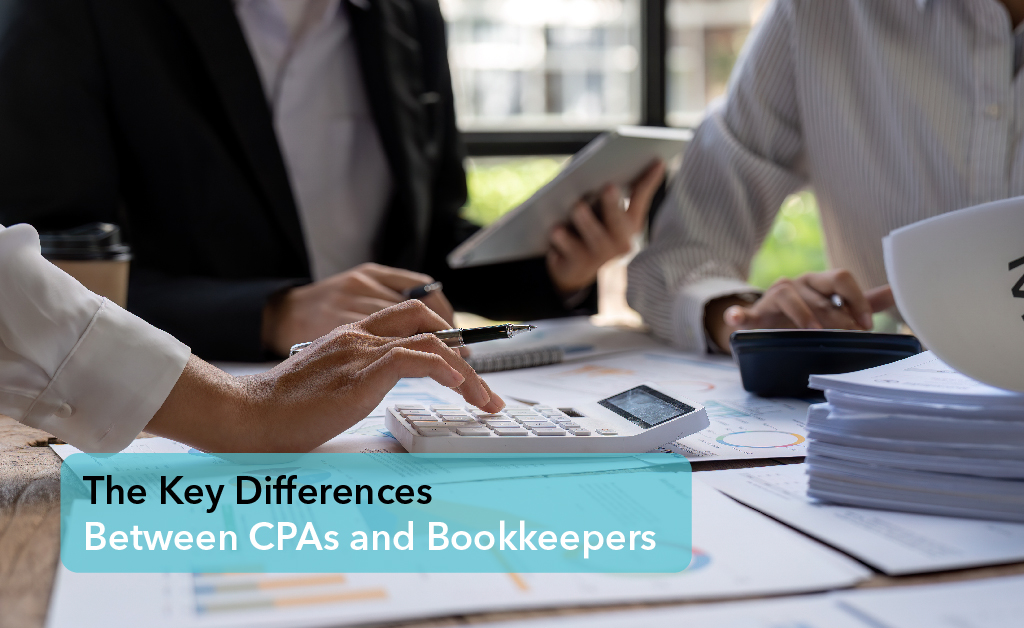
As a business owner, keeping your finances in order is essential to your success. However, managing your finances can be time-consuming and challenging, especially if you lack the expertise to handle them effectively. That’s where accounting professionals come in.
Two of the most commonly consulted professionals for managing finances are Certified Public Accountants (CPAs) and bookkeepers. While both professionals deal with financial information, their roles, responsibilities, and qualifications differ significantly. While specialised online bookkeeping courses can walk you through the details of what entails to become either a CPA or bookkeeper, this article can give you knowledge comprehensive enough so you can determine which professional is best for your business.

Differentiating By Role
Both CPAs and bookkeepers deal with financial information, but they are not interchangeable. CPAs are accountants who have gone through rigorous education, testing, and certification processes to earn their designation. On the other hand, bookkeepers do not require a specific degree or certification, but they must have a certain level of education to perform their duties.

What are The Responsibilities of a Bookkeeper?
A bookkeeper is responsible for maintaining an organization’s financial records. They record all transactions, including expenses, revenues, and payments, in the organization’s financial books. They are also responsible for ensuring that all financial records are accurate and up-to-date.
Here is a detailed list of all their duties:
Recording Financial Transactions
Bookkeepers record all financial transactions for an organisation. This includes income, expenses, payments, and receipts.
Maintaining Accurate Financial Records
Bookkeepers ensure that all financial records are accurate and up-to-date. They also maintain proper documentation for all financial transactions.
Reconciling Accounts
Bookkeepers reconcile accounts by comparing financial records with bank statements to ensure that all transactions are accounted for.
Generating Financial Reports
Bookkeepers generate financial reports, including income statements, balance sheets, and cash flow statements.
Managing Accounts Payable and Receivable
Bookkeepers manage accounts payable and receivable by tracking and processing payments.
Bookkeeper Qualifications
Bookkeepers do not require a specific degree or certification to perform their duties. However, they must have a certain level of education and experience to be successful. The completion of High School is typically the minimum educational requirement, but many bookkeepers also have a short course completed in a relevant field. Additionally, bookkeepers must have excellent organizational skills, attention to detail, and proficiency in using accounting software.
Bookkeeping Services
Bookkeepers can provide a range of services to businesses, including:
Accounts Receivable and Payable
Bookkeepers can manage accounts payable and receivable by tracking and processing payments.
Bank Reconciliation
Bookkeepers can reconcile bank accounts to ensure that all transactions are accounted for.
Payroll
Bookkeepers can manage payroll by tracking employee hours, calculating pay, and issuing paychecks.
Financial Reporting
Bookkeepers can generate financial reports, including income statements, balance sheets, and cash flow statements.

What are The Responsibilities of a CPA?
A Certified Public Accountant has gone through a rigorous education, testing, and certification process to gain a thorough understanding of accounting principles, tax laws, and financial regulations. Here is a detailed list of their duties and responsibilities:
Auditing and Assurance
CPAs perform auditing and assurance services, which involve reviewing an organization’s financial records and issuing an opinion on their accuracy and completeness. This can include conducting an audit of the organization’s financial statements, performing a review of financial records, or providing attestation services.
Tax Planning and Preparation
CPAs are experts in tax planning and preparation. They can help businesses minimize their tax liability by identifying deductions, credits, and other tax-saving strategies. They can also prepare tax returns and ensure compliance with all applicable tax laws and regulations.
Financial Planning and Analysis
CPAs can provide financial planning and analysis services to help businesses make informed decisions. This can include creating financial models, analysing financial data, and developing financial forecasts.
Consulting Services
CPAs can provide consulting services to businesses, including advising on mergers and acquisitions, developing internal control systems, and conducting fraud investigations.

CPA Qualifications
CPAs are required to meet specific education, experience, and testing requirements to earn their designation. This typically involves earning a bachelor’s degree in accounting or a related field, completing a certain number of accounting and business courses, and passing the CPA exam. Additionally, CPAs must meet ongoing education requirements to maintain their certification.
Can a CPA Provide Bookkeeping Services?
While CPAs can provide bookkeeping services, it’s not always the case. While bookkeeping is a fundamental part of accounting, as already discussed above, CPAs typically focus on more complex financial services, such as auditing, financial planning, and tax preparation.
What Can a CPA Do That a Bookkeeper Cannot?
CPAs can provide a range of financial services that bookkeepers are not qualified to perform, such as auditing, financial planning, and tax preparation. CPAs are also authorised to sign off on financial statements, which is an essential part of the audit process.

Do You Need a Public Accountant Certification To Be a Bookkeeper?
No, you don’t need to be a CPA to offer bookkeeping services. Bookkeeping is a separate profession from accounting. Bookkeepers can work independently or as part of an accounting team, and their responsibilities typically focus on maintaining accurate financial records.
Are All Bookkeepers CPAs?
No, not all bookkeepers are CPAs. As already mentioned above, bookkeeping and accounting are separate professions, and while some CPAs may also work as bookkeepers, many bookkeepers do not hold CPA qualifications.
What Does a Bookkeeper Do for a CPA?
Bookkeepers play a crucial role in supporting CPAs by maintaining accurate financial records, which can be used for financial analysis and decision-making. Bookkeepers may also assist with basic tax preparation and provide administrative support to the CPA.
Should You Be a Bookkeeper or a CPA?
The answer to this question depends on your interests, qualifications, and career goals. Bookkeeping can be an excellent career choice for those who enjoy working with numbers, maintaining records, and providing support to accounting professionals. On the other hand, if you aspire to provide more complex financial services, such as auditing or financial planning, becoming a CPA may be the right path for you.

What Are The Education Requirements for CPA and Bookkeepers?
To become a bookkeeper, you typically need the completion of high school or equivalent, although some employers may require further education in the form of a short accounting or bookkeeping course. On the other hand, becoming a CPA requires a bachelor’s degree in accounting or a related field, completion of the CPA exam alongside fulfilling specific experience and other education requirements.

Choose Your Path
While both bookkeepers and CPAs play important roles in managing a business’s finances, their services differ significantly.
Bookkeepers focus on maintaining accurate financial records and generating financial reports, while CPAs provide a range of services, including auditing and assurance, tax planning and preparation, financial planning and analysis, and consulting services.
Deciding whether to hire a bookkeeper or CPA depends on the needs of your business, but both can provide valuable benefits. Whether you need help with basic record-keeping or require more complex financial services, there is a professional who can help your business achieve its financial goals.
If you want to know more about accounting and bookkeeping or desire to become a professional yourself, sign up for a bookkeeping course with Careers Collectiv so you can jumpstart your journey.